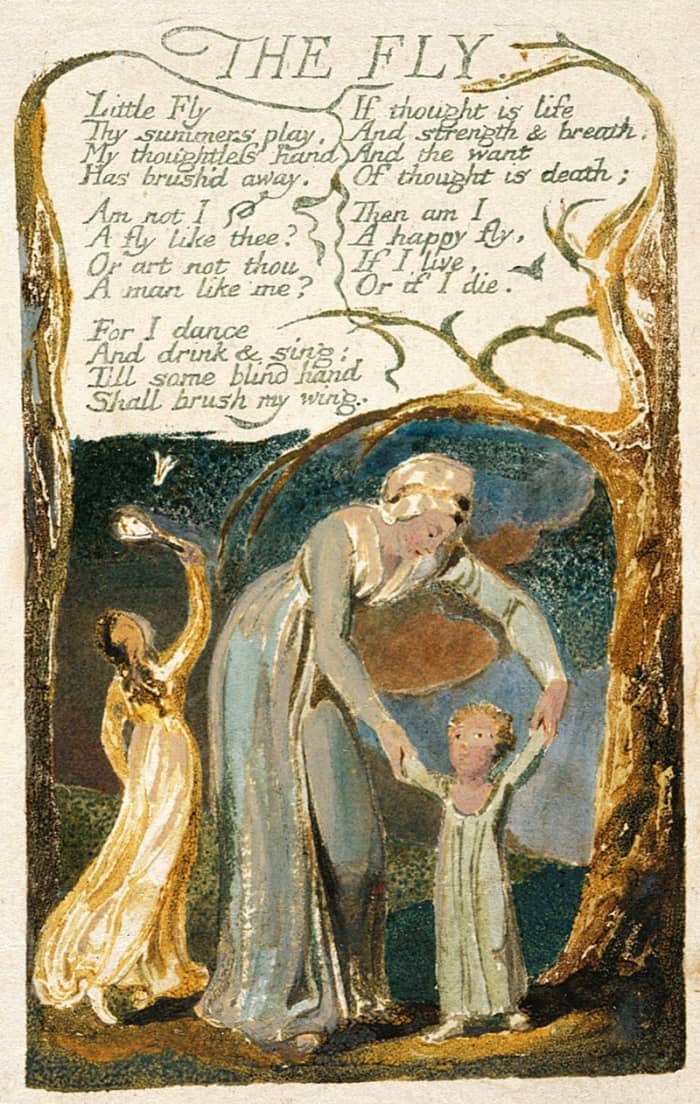
Analysis of Poem 'The Fly' by William Blake Owlcation
Summary. The speaker draws a comparison between himself and a fly that he has thoughtlessly brushed away. He asks if he is like the fly, or the fly is more like himself. He imagines another, greater hand, perhaps that of God, brushing him away some day and ending his private designs. He concludes with the belief that he is indeed like the fly.
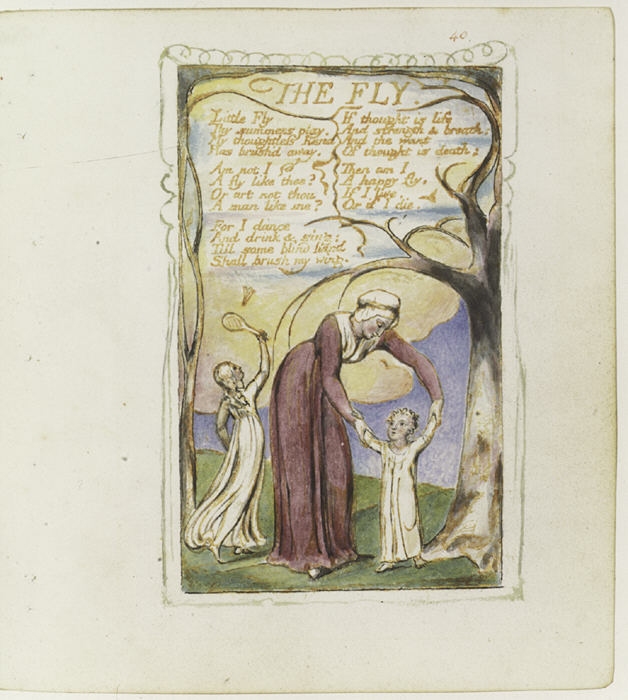
William Blake Songs of Experience The Fly The Metropolitan Museum of Art
Little Fly William Blake (1757-1827) Overview Bloody flies, always sitting on our food and making irritating buzzing noises. Squashing or swatting one of these buggers is normally one of the happiest moments of our lives, making us feel like untapped ninja talent, but Blake spoils all this by getting philsophical about it. This poem is […]
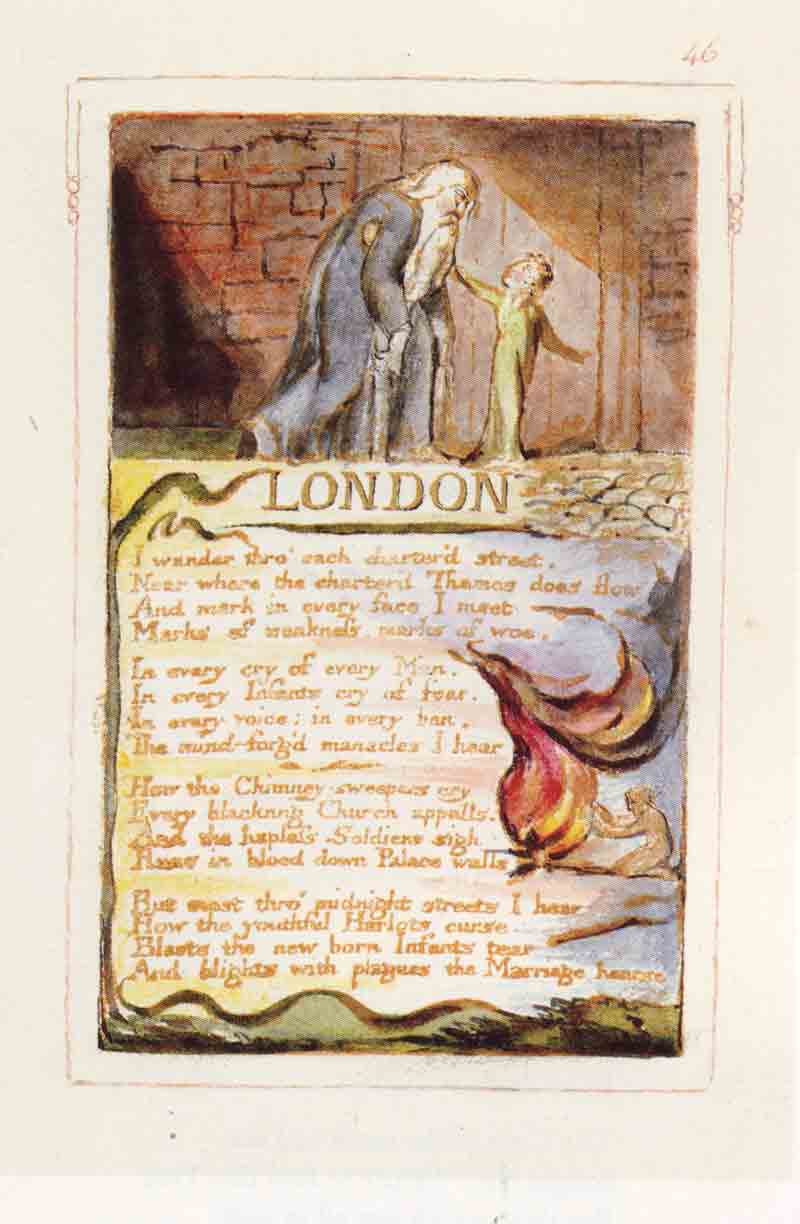
William Blake’s “London” Summary & Analysis SchoolWorkHelper
Full Plot Summary. Mr. Woodifield, a retired man who has recently suffered a stroke, sits in the office of his former employer. Mr. Woodifield's wife and daughters keep him home most of the time because they are concerned for his health, but each Tuesday he is allowed to venture into the city. Mr. Woodifield chooses to spend this time.

A Retail Life After the MFA Analysis of "The Fly" by William Blake
In the first lines of this poem, the poet introduces the fly as an innocent creature engaged in "summer's play.". This implies that it's enjoying the freedom and ease of summer. The poet uses a whimsical tone in these lines, treating the fly as playful and harmless. There is a shift in the next lines, though. The word "thoughtless.

The Fly William Blake YouTube
The poem "The Fly" written by William Blake was published in 1794 in his poetry collection "Songs of Experience". The collection contained 26 poems. "The Fly" depicts an ordinary daily life incident which we would rather ignore. A disturbing fly killed by accident provokes the thoughts of the poet's tender heart.
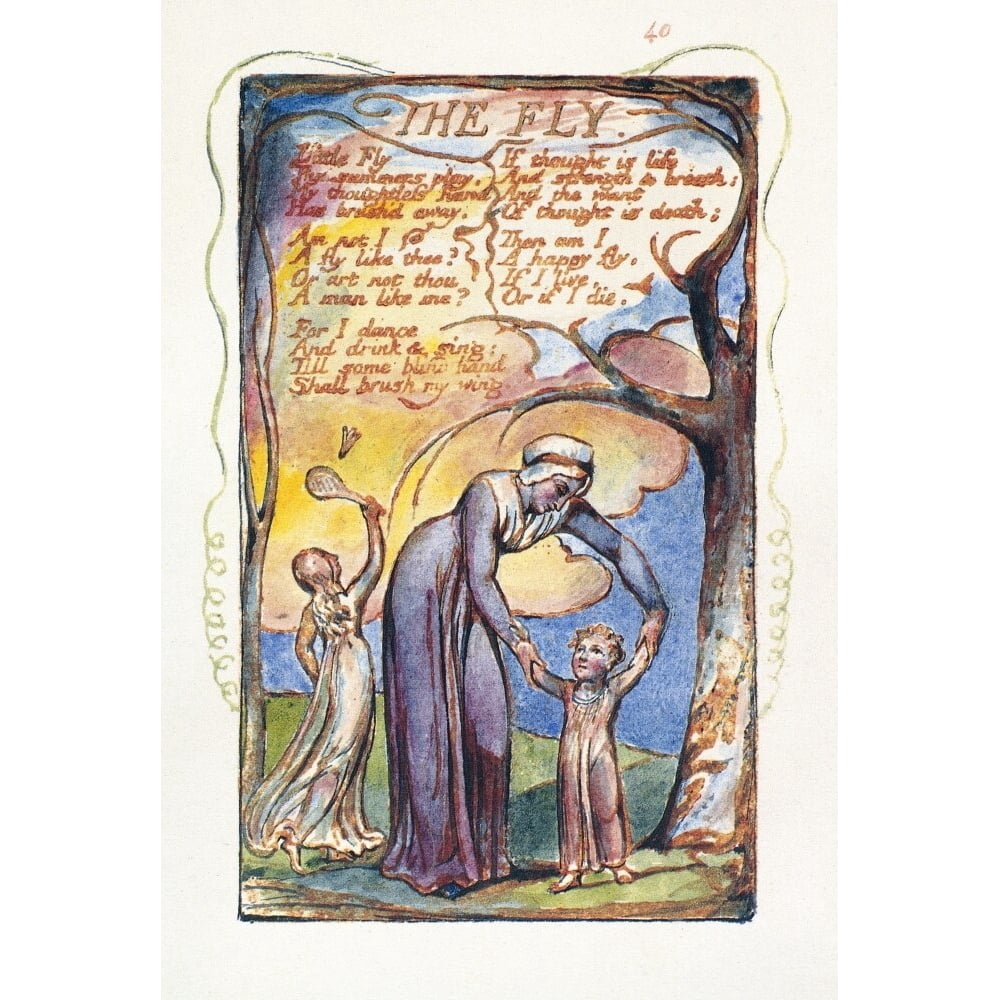
Blake Songs Of Experience. /N'The Fly.' Color Relief Etching By William Blake From His 'Songs
Learn More. "The Fly" is one of English Romantic poet William Blake's visionary poems from Songs of Experience (the second volume of his groundbreaking 1794 collection Songs of Innocence and of Experience ). The poem's speaker "thoughtless [ly]" swats a fly, then consoles himself by reflecting that his life and the fly's are basically the same.

Biography of William Blake
The boss tries to stir life into the fly with the tip of the pen, ordering it to "look sharp!". But it is dead. He uses the blade of a paper knife to fling its corpse into a nearby waste basket, overcome with a feeling of desolation. Pressing the button for the messenger, he sternly asks for fresh blotting paper.

The Fly, from 'Songs Of Experience', by William Blake YouTube
In "The Fly" by William Blake, the poet presents a contemplation on the interconnectedness of life and mortality. Through the imagery of a fly's brief existence, Blake delves into the philosophical concepts of existence, thought, and the significance of life's fleeting moments. The Fly by William Blake. Little Fly, Thy summer's play My.
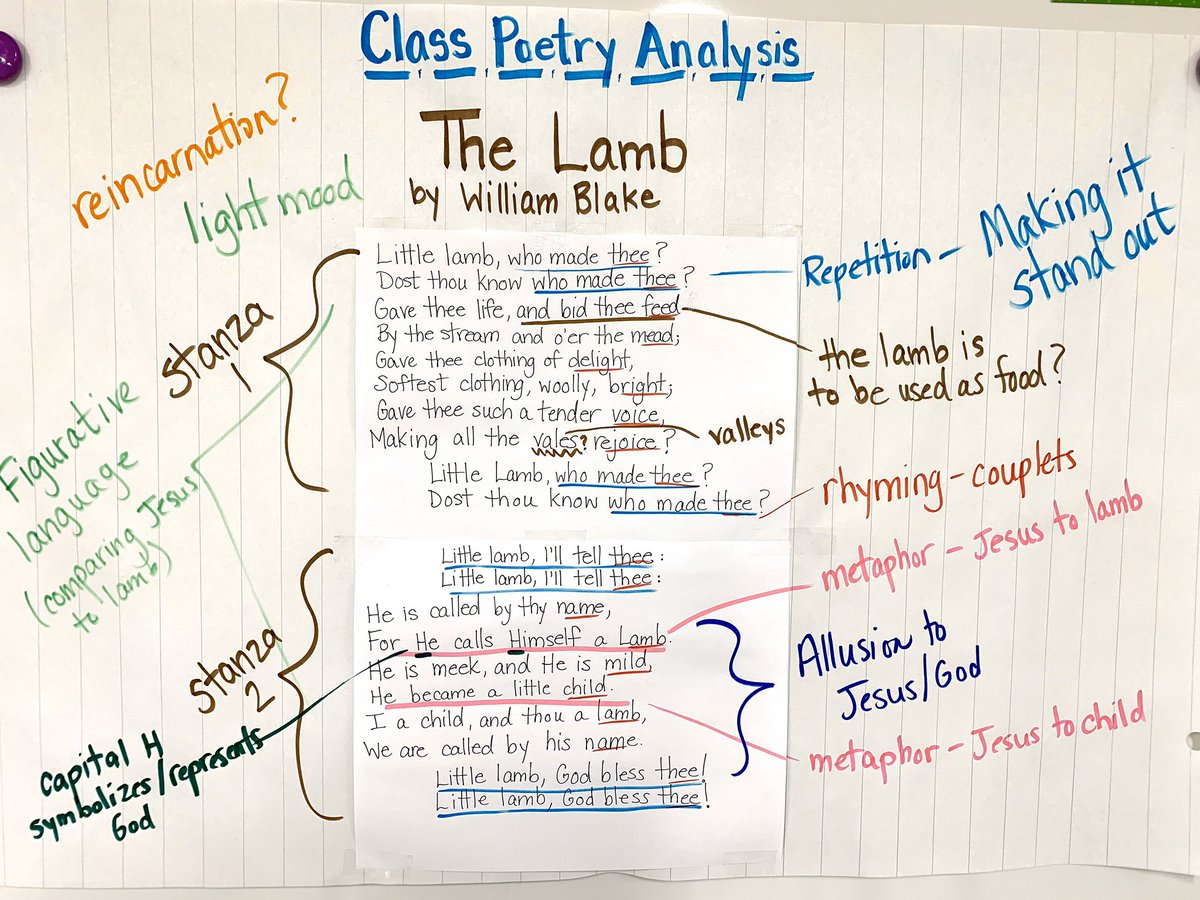
The Lamb By William Blake.analysis
The Fly was set to music in 1965 by Benjamin Britten as part of his song cycle Songs and Proverbs of William Blake. It appears also in the song London on the 1987 Tangerine Dream album Tyger which is inspired by poetry of Blake. Esperanza Spalding recorded this poem on her 2010 album Chamber Music Society. Cosmo Sheldrake set this poem to music.

De Vlieg (vertaling gedicht The Fly van William Blake) LEO MESMAN Gedichten & Foto’s
The Fly is one of the "Songs of Experience" written and etched by William Blake (1757-1827) between 1789 and 1794. These were published alongside his "Songs of Innocence" with the aim of.

The Fly william Blake by lemonmarshmallow on DeviantArt
Analysis. On a Tuesday in an office in "the City," the boss and his former employee Mr. Woodifield are midway through conversation. "Old Woodifield" is seated in an immense armchair, looking out "as a baby peers out of its pram" to the boss who is confidently lounging at his desk. Woodifield, who retired after a stroke, knows he.
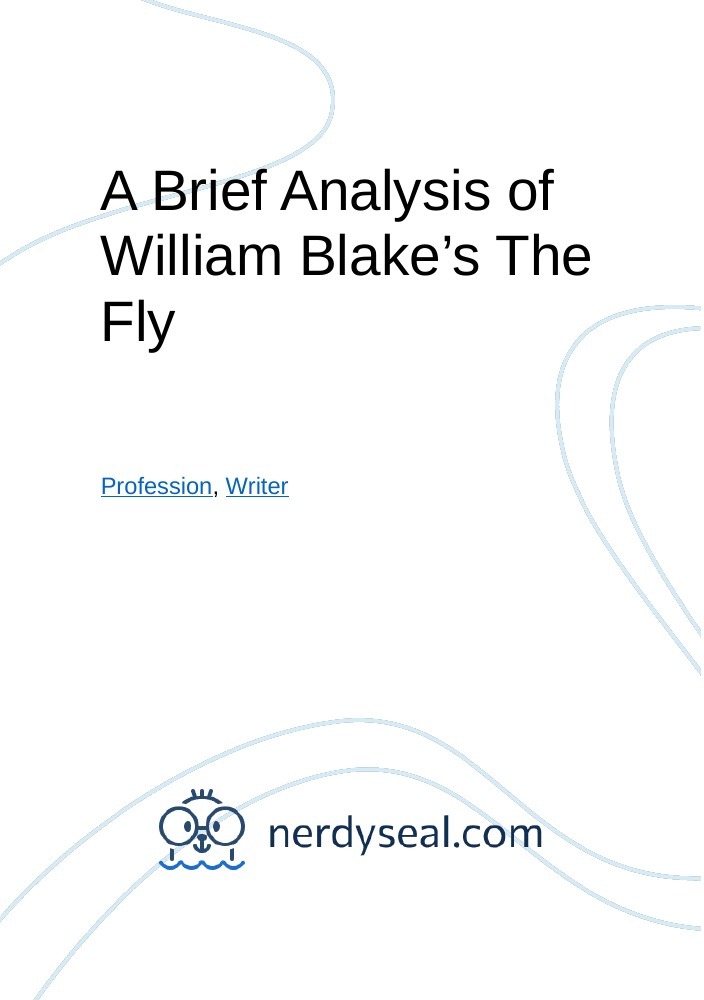
A Brief Analysis of William Blake's The Fly 274 Words NerdySeal
William Blake's "The Fly" offers a similar thematic connection: "For I dance, And drink, and sing, Till some blind hand Shall brush my wing.". In "The Fly," the boss draws parallels to some of Mansfield's characters from her other works, including the stern, patriarchal figures of Andreas Binzer in "A Birthday," Stanley.

William Blake's poem The Fly YouTube
For I dance, And drink, and sing, Till some blind hand Shall brush my wing. If thought is life And strength and breath, And the want Of thought is death; p. 49 Then am I A happy fly. If I live, Or if I die. Previous sectionSongs of Experience, The Sick RoseNext sectionSongs of Experience, The Angel.

'The Fly', by William Blake YouTube
In this poem, the speaker, presumably Blake, compares himself to the fly that he has casually brushed away. He and the fly mirror each other. A fly is a tiny disregarded creature, but then so is a.

[95+] William Blake Citation Anglais
William Blake's "The Fly" is a thought-provoking poem that explores the complexities of human existence through the metaphor of a tiny insect. In this comprehensive literary analysis, we will delve into the themes, symbolism, and literary devices used by Blake to convey his message. From the fleeting nature of life to the inevitability of.

William Blake The Fly Genius
William Blake and a Summary of 'The Fly' 'The Fly' is a short poem from William Blake's book Songs of Innocence and Experience, written for adults and children, exploring the dual nature of the human soul. Lyrical, with rhyme, the poem focuses on a fly observed by a first-person speaker. As the lines progress, the relationship between the fly.